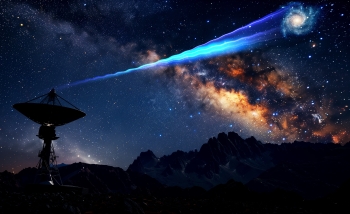Last month's landmark announcement that the LIGO collaboration had detected gravitational waves sent ripples of excitement around the world.
The discovery marked another stunning confirmation of Einstein's general relativity, and signalled the dawn of a new era in astronomy.
For Tim Blais, the mastermind and versatile voice behind popular YouTube channel A Capella Science, it was also an invitation to get creative.
Perimeter Institute partnered with Blais to help create his latest nerd-pop parody, "LIGO Feel That Space" (sung to the tune of The Weeknd's "Can't Feel My Face").
After you've grooved to gravitational waves, check out our interview with Blais (posted below) about his quirky niche between pop music and deep science.
Interview with Tim Blais, the maestro of A Capella Science
Perimeter Institute: How and why did A Capella Science come to be?
Tim Blais: The germ of the idea came one night when I was working on my master's in physics. I have an absolutely awful attention span, so time spent in my office was always about one-third work and two-thirds distraction. At one point, I was killing time watching a cappella YouTube videos thinking: "I could do this. I should do this!" It struck me that I had this unique body of science and music knowledge that I'd never seen combined the way I knew I could. But of course that points to the real origin of A Capella Science: every life experience that's led me to this set of interests and skills. If you want to go all the way back, you'd probably have to start when I was three, which is when I joined my mom's church choir and simultaneously discovered Bill Nye the Science Guy.
PI: What kinds of surprises and rewards has the project brought about?
TB: Well, I never really expected to be making my living with it, so that's nice! But seriously, it's been surprising from the start. It's usually so hard to be discovered as an artist that I expected to make a lot of videos in obscurity before anyone took notice, if they ever did. Instead, my very first video, "Rolling in the Higgs" (a parody of Adele's "Rolling in the Deep"), really caught the wave of the 2012 Higgs boson discovery and went viral. Looking back, it's a little embarrassing actually; if I'd known so many people would see that video, I would have sung it better!
Aside from that, the project has certainly made life interesting. I've ridden a tour bus with synth-pop pioneer Thomas Dolby; I've met some of my favourite science YouTubers like (Perimeter alumnus) Henry Reich of MinutePhysics; last year I was on the CBC reality show "Canada's Smartest Person," where I met some of the most amazing people I know. The most rewarding thing is the comments and support I get from the people who watch and enjoy A Capella Science. Someone I've never met recently told me in an email that he, along with his wife and two kids, have been singing "Bohemian Gravity" in four-part harmony. How do you top that?
PI: What is the process behind making a song/video?
TB: It starts with a good idea, which is a really hard thing to produce on command. I'm constantly researching, mulling over topics I'm interested in and songs I like, and once in a while something congeals out of the soup of possibilities and floats to the surface. Once I've got the hook of an idea, I start really researching the topic in depth, letting myself get a feel for the most important themes and concepts. Often good puns or singable lines will jump out at me during that process and I'll pretty much just keep jotting them down until I've filled out the whole song. Then there's the whole technical and performance aspects of actually making the thing, where I hide in my bedroom-cum-sound/video studio for several weeks and my roommates hear a lot of weird noises coming through the walls. I won't bore you with the production details, but it's generally a couple-hundred hours of work from start to finish (watch a behind-the-scenes video on the making of Eminemium)
PI: You’ve mentioned that Perimeter Institute has influenced/inspired some of your work. How so?
TB: I got a chance to hang around Perimeter for a few days last summer for Convergence, and I loved it there! One thing that I've really missed, being out of academia these past three years, has been that connection with the leading edge of what's going on in physics, and with people who are all banging their heads against the most exciting new concepts and discoveries. I think having fascinating conversations with smart people just makes your brain work better. I finished writing two songs while I was at Perimeter, and neither of them was even about topics being discussed at the conference. And then, of course, I left with two or three brand new ideas as well. I love how easy Perimeter makes it to just run into people and start swapping ideas and learning what they're puzzling over.
PI: What do you hope your work will achieve? Where do you want to take it in the future?
TB: It's funny: when I started I didn't really know who was going to connect with this project. The answer seems to be "a surprising array of people." I get messages from senior engineers and professors telling me they love what I do, but also from teachers and parents who say I inspired their student or their eight-year-old. That wasn't intentional – it just grew out of me taking the array of stuff I was interested in, from music production to YouTube to theoretical physics, and combining it into something I thought ought to exist. I think people can sense when you're really taking pleasure in what you do, and they respond to that. So I guess I'll keep looking for the next thing that excites me, and those things range from stage musicals to virtual reality to hip-hop to philosophy to 16th century choral music. Not to mention the frontiers of science. Stay tuned!
PI: Anything else you'd like to share? Fire away!
TB: I always try to encourage people, especially young people, to let themselves be swept up by the things they find truly fascinating. Whether it relates to your current job, degree, or eventual career, or not. I'm always going to be a physics geek – I stayed up until 4 a.m. to watch the LHC Higgs announcement three-and-a-half years ago, just as I dropped everything to watch LIGO's gravitational wave announcement last month. But I'm also always going to be a musician, a performer, songwriter, a punster.
My life would be immensely less satisfying if I restricted myself to one of those parts of me, to the exclusion of all else. I know I'm lucky to be able to combine all those aspects of myself into a single job. After all, 10 years ago "YouTuber" wasn't a job people had; in another decade, the bit of yourself you thought would never be useful might be exactly what you need.
You can watch all of Tim Blais' A Capella Science videos on his YouTube channel, or visit his crowdfunding page to learn how to support his next videos.
About PI
Perimeter Institute is the world’s largest research hub devoted to theoretical physics. The independent Institute was founded in 1999 to foster breakthroughs in the fundamental understanding of our universe, from the smallest particles to the entire cosmos. Research at Perimeter is motivated by the understanding that fundamental science advances human knowledge and catalyzes innovation, and that today’s theoretical physics is tomorrow’s technology. Located in the Region of Waterloo, the not-for-profit Institute is a unique public-private endeavour, including the Governments of Ontario and Canada, that enables cutting-edge research, trains the next generation of scientific pioneers, and shares the power of physics through award-winning educational outreach and public engagement.
You might be interested in


